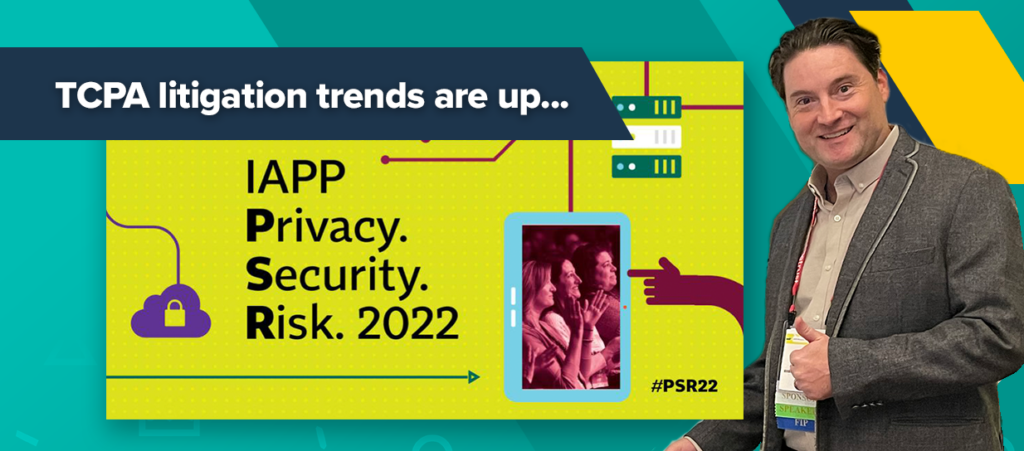TCPA Litigation and Compliance Risks: What You Can Do to Protect Yourself

Reaching out to consumers about your products or services is risky. One of the biggest compliance challenges businesses face is adhering to Telephone Consumer Protection Act (TCPA) regulations, which change often and can cause companies to incur fines or face lawsuits due to violations. If you call or text someone without having proof of their prior express written consent to be contacted, you could risk losing money and even your brand’s reputation.
ActiveProspect is always monitoring TCPA updates and developing ways our clients can protect themselves. We recently attended the International Association of Privacy Professionals (IAPP) 2022. Ben Farrar, our Director of Privacy, Security, & Compliance, held a speaking session called “TCPA Litigation Trends Are Up. Time for a Simple Consent to Contact Solution.” In this discussion, he spoke about the importance of having documented proof of consent to contact consumers so companies can avoid potential lawsuits.
Are you wondering if you need to follow the best practice of documenting consent? Let’s explore which industries typically contact consumers and how they can take steps to protect themselves.
Should You Be Paying Attention to TCPA Legal and Compliance Risks?
If you have a call center, work in lead generation or lead acquisition, or are exploring social media lead ads, then the answer is “Yes!” Common industry verticals that reach out to consumers via phone calls or text messages include insurance, home services, warranty services, and financial services (to name a few). Basically, if you reach out to leads, you need proof that they consented to be contacted so you can avoid the risk of costly litigation.
The TCPA’s reach includes automatic telephone dialing systems (ATDS), robo calls, landlines, mobile phones, and text messages, and the laws for contacting consumers change constantly. If you use one or more of these methods to contact leads, there is a chance someone you contact could pursue litigation if they believe they did not consent to hear from you.
However, if you have a record that they agreed to be contacted, you can use that in your defense.
TrustedForm: A Consent-to-Contact Solution
The TCPA’s rules are not going away; in fact, it has many compliance obligations and interpretations that change frequently. One of the ways you can help to protect your business is by having someone’s prior express written consent documented so you can use it as evidence in the event you face TCPA violations.
One consent-to-contact solution is ActiveProspect’s TrustedForm lead certification product. It verifies, retains, and proves consent for each individual lead by issuing a certificate that shows the information the lead entered and even a replay of their actions on the screen. By retaining this certificate, you can see the exact mouse movements and keystrokes the lead made while entering their information and agreeing to be contacted.
If you’d like to learn more about TrustedForm and how it can help you to prove and retain documentation of consent, contact us today to schedule a demo.
If you missed IAPP and want to hear Ben’s wisdom, check out our recording below!

